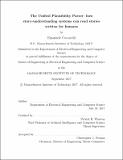The unified plausibility parser : how story-understanding systems can read stories written for humans
Author(s)
Ceccarelli, Emanuele
DownloadFull printable version (4.466Mb)
Alternative title
How story-understanding systems can read stories written for humans
Other Contributors
Massachusetts Institute of Technology. Department of Electrical Engineering and Computer Science.
Advisor
Patrick H. Winston.
Terms of use
Metadata
Show full item recordAbstract
In this thesis, I describe how the difficult task of understanding ungrammatical and complex sentences may be tackled by leveraging the power of expectation. Genesis, a state of the art story understanding system, currently struggles to read any sentences that have not been written specically with it in mind, even when these sentences are understandable by humans with little to no ambiguity. If we want to develop a computational account of human intelligence via Genesis, then it is of fundamental importance that Genesis can interact directly with text meant to be read by humans. For this purpose, I designed and implemented in Java the Unified Plausibility Parser (UPP), a tool whose goal is to interpret complex and ungrammatical sentences and translate them to a language that Genesis can understand. UPP has access to Genesis's knowledge base, and it uses it to develop expectations about what sentence structures should be. Then, UPP can tackle ungrammatical and complex sentences by generating plausible interpretations to them and selecting the one that best ts the expectations previously developed. UPP develops and uses expectation with the method of lattice learning. In this this thesis, I will also describe a new lattice learn- ing framework, which can represent the plausibility of complex sentences using only positive examples. Using a knowledge base of just a handful of examples, UPP can successfully parse and disambiguate the meaning of sentences that were previously impossible to understand by Genesis or any of its subsystems.
Description
Thesis: M. Eng., Massachusetts Institute of Technology, Department of Electrical Engineering and Computer Science, 2017. This electronic version was submitted by the student author. The certified thesis is available in the Institute Archives and Special Collections. Cataloged from student-submitted PDF version of thesis. Includes bibliographical references (page 91).
Date issued
2017Department
Massachusetts Institute of Technology. Department of Electrical Engineering and Computer SciencePublisher
Massachusetts Institute of Technology
Keywords
Electrical Engineering and Computer Science.